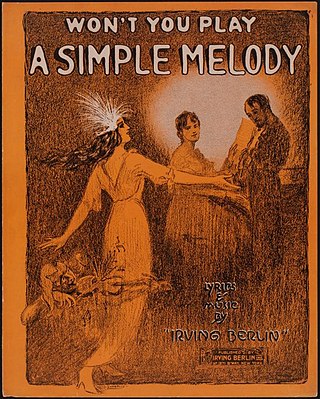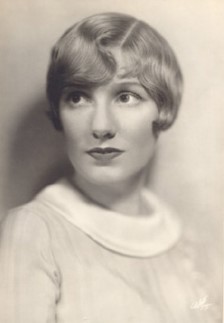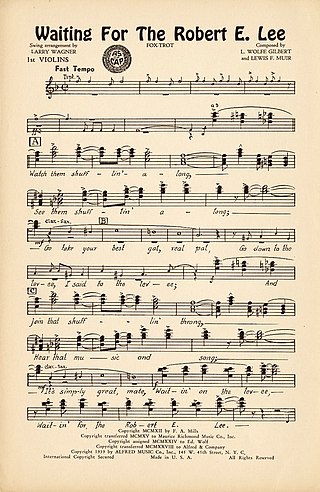
"Goodnight, Irene" or "Irene, Goodnight," is a 20th-century American folk standard, written in 3
4 time, first recorded by American blues musician Huddie 'Lead Belly' Ledbetter in 1933. A version recorded by the Weavers was a #1 hit in 1950.
"Begin the Beguine" is a popular song written by Cole Porter. Porter composed the song during a 1935 Pacific cruise aboard the Cunard ocean liner Franconia from Kalabahi, Indonesia, to Fiji. In October 1935, it was introduced by June Knight in the Broadway musical Jubilee, produced at the Imperial Theatre in New York City.

"Play a Simple Melody" is a song from the 1914 musical, Watch Your Step, with words and music by Irving Berlin.

"The Way You Look To-night" is a song from the film Swing Time that was performed by Fred Astaire and composed by Jerome Kern with lyrics written by Dorothy Fields. It won the Academy Award for Best Original Song in 1936. Fields remarked, "The first time Jerry played that melody for me I went out and started to cry. The release absolutely killed me. I couldn't stop, it was so beautiful."
"Heat Wave" is a popular song written by Irving Berlin for the 1933 musical As Thousands Cheer, and introduced in the show by Ethel Waters.

"Good Rocking Tonight" is a jump blues song originally released in 1947 by its writer, Roy Brown and was covered by many recording artists. The song includes the memorable refrain, "Well I heard the news, there's good rocking tonight!" The song anticipated elements of rock and roll music.
"Sweet Dreams" or "Sweet Dreams (of You)" is a country ballad, which was written by Don Gibson. Gibson originally recorded the song in 1955; his version hit the top ten of Billboard's country chart, but was eclipsed by the success of a competing recording by Faron Young. In 1960, after Gibson had established himself as a country music superstar, he released a new take as a single. This version also charted in the top ten on the country chart and also crossed over to the Billboard Hot 100, where it peaked at No.93. The song has become a country standard, with other notable versions by Patsy Cline and Emmylou Harris.
"I'll Be Seeing You" is a popular song about missing a loved one, with music by Sammy Fain and lyrics by Irving Kahal. Published in 1938, it was inserted into the Broadway musical Right This Way, which closed after fifteen performances. The title of the 1944 film I'll Be Seeing You was taken from this song at the suggestion of the film's producer, Dore Schary. The song is included in the film's soundtrack.
"Easter Parade" is a popular song, written by Irving Berlin and published in 1933. Berlin originally wrote the melody in 1917, under the title "Smile and Show Your Dimple", as a "cheer up" song for a girl whose man has gone off to fight in World War I. A recording of "Smile and Show Your Dimple" by Sam Ash enjoyed modest success in 1918.
"Now It Can Be Told" is a popular song written by Irving Berlin for the 1938 film Alexander's Ragtime Band, where it was introduced by Alice Faye and Don Ameche. It was nominated for an Academy Award in 1938 but lost out to "Thanks for the Memory".

"After You've Gone" is a 1918 popular song composed by Turner Layton with lyrics by Henry Creamer.

Marion Harris was an American popular singer who was most successful in the late 1910s and the 1920s. She was the first widely-known white singer to sing jazz and blues songs.
"Say It Isn't So" is a popular torch song by Irving Berlin, published in 1932. The song was written when Berlin was suffering a loss of confidence following several setbacks, and he initially placed the song in a drawer, feeling that it would not be successful. However, one of Berlin's employees, Max Winslow, heard it, and on his own initiative, took it to Rudy Vallée, who was then a major star on radio. Vallee sang it on his radio show and it became an immediate hit.

"That Mysterious Rag" is a song by Irving Berlin and Ted Snyder written in 1911. It was one of the earliest Berlin songs to become a commercial success with recordings by Arthur Collins & Albert Campbell and by the American Quartet being very popular in 1912.
"I Still Miss Someone" is a song co-written by Johnny Cash and his nephew Roy Cash, Jr. and originally recorded by American country music singer Johnny Cash. He first recorded it in 1958 as the B-side to "Don't Take Your Guns to Town".

The Village of St. Bernadette is the sixth studio album by American pop singer Andy Williams and was released in early 1960 by Cadence Records. It was described by Billboard magazine as "a lovely set of pop inspirational, hymns, and religious themes".

"Waiting for the Robert E. Lee" is an American popular song written in 1912, with music by Lewis F. Muir and lyrics by L. Wolfe Gilbert. The "Robert E. Lee" in the title refers to the steamboat of that name.
"Sweet Sue, Just You" is an American popular song of 1928, composed by Victor Young with lyrics by Will J. Harris. Popular versions in 1928 were by Earl Burtnett and by Ben Pollack.
"Say It with Music" is a popular song written by Irving Berlin. It was introduced in the Music Box Revue of 1921, where it was the de facto theme song and sung as a duet. The song was popularised by Paul Whiteman and His Orchestra on 30 August 1921; this recording debuted on the charts on 12 November of that year, remained there for 14 weeks and peaked at number 1. Other popular versions in 1921/22 were by John Steel and by Ben Selvin.

George Wayne Fairman (1881–1962) was a lyricist, composer, and music publisher whose work includes popular songs. Several of his songs charted including two that reached #1. Fairman's work includes coon songs, ragtime, songs related to World War I, and a foxtrot.









